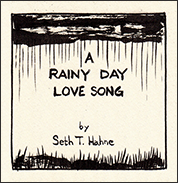Daily Graphic Novel Recommendation 162

The Moon Moth
by Jack Vance, adapted by Humayoun Ibrahim
Genre notes: sci-fi, murder, music
128 pages
ISBN: 1596433671 (Amazon)
On Sirene, the world central to The Moon Moth, conversation is blatantly far from equitable. All discussion is embellished, pronounced, and finally given meaning through the use of instruments. Each instrument has a particular purpose, a goal through which status and intent is communicated. One instrument may convey wrath to a lesser member of the social hierarchy, while another when properly used may convey polite obsequience to a person of superior standing. Only the slave caste sings conversations unaccompanied by instrumentation, and that is a bare mark of their low station. Further complicating matters each citizen wears a mask, the make of which further codifies social station and directs which instruments should be played in conversation with each other citizen.
All interactions on Sirene are conducted according to the concept of personal honour. There is no currency beyond one’s personal honour—or more properly, what personal honour one may convince others he possesses. A citizen may wear a grand mask if he has the honour to pull it off. A citizen may take goods of the finest craftsmanship if he has the honour that would allow him to do so. On Sirene fortune favours not merely the bold however, for overstepping one’s honour may lead to a speedy decapitation. Foreigners, then, are at a distinct disadvantage on this world, and being an offworlder ambassador would be a trial of great magnitude for even the most quick-witted diplomat.
The Moon Moth is constructed as a sort of thriller, engaging a not-so-quick-witted ambassador as he tries to unearth a murderer whose face he cannot know—after all, on Sirene we all wear masks and may change our masks at will so long as we can keep up with the demands of the masquerade. While there is some excitement over protagonist Ser Thissel’s dilemma as he tries to detect a man who may be undetectable, the plot is not the book’s central joy. This is good because that avenue is rather thin and even as the narrative turns to its final twist, we recognize that the story may have only ever been an excuse for us to engage Vance’s strange, intricate world. I was fine with the story, but Ser Thissel (nearly incompetent for much of the book) and reaching the climax were never my motivations for remaining in The Moon Moth's grip.
Not only is Vance’s world fascinating, but Ibrahim’s visual translation of the instrumental idea leaves me wondering how the story could have ever succeeded in bare prose. While I generally found Ibrahim’s figure-drawing a weakness, the manner by which he effortlessly demonstrates both the instrument being used and the technical proficiency with which it is being played is so winning that I can hardly imagine the story in any other form. Comparing Ser Thissel’s lurching melodic incompetence with the natural musicianship of Sirene’s natives is caught by readers at a glance and the story’s purposes are never hindered for lack of craftsmanship on this score.
There are some bumps to the road, however; the chief of which is the natural difficulty in translating a foreign language for readers in such a way as to make the text flow effortlessly. Because The Moon Moth is chiefly concerned with the exploration of a music/status based language, converting that simply to wholly verbal expression would be inadequate. There is some learning curve demanded of readers and Ibrahim does what he can to help by providing at the book’s frontmatter a visual glossary of several instruments, the sounds they make, and the social implications of using each instrument. For the first few exchanges readers will doubtlessly be turning back to this glossary as an aid to understanding. Due this break in the reading rhythm, one’s first experience of the text may feel staggered and a bit too staccato. I felt some of this myself but found a second reading to be far less punctuated and discovered a rhythmic sense that I missed on my first read-through.
Good Ok Bad features reviews of comics, graphic novels, manga, et cetera using a rare and auspicious three-star rating system. Point systems are notoriously fiddly, so here it's been pared down to three simple possibilities:
3 Stars = Good
2 Stars = Ok
1 Star = Bad
I am Seth T. Hahne and these are my reviews.
Support me by buying my art on Etsy
Review copy submission may be facilitated via the Contact page.
Browse Reviews By
Other Features
- Popular Sections:
- All-Time Top 500
- All the Boardgames I've Played
- All the Anime Series I've Seen
- All the Animated Films I've Seen
- Top 75 by Female Creators
- Kids Recommendations
- Daily Recommendations
- What I Read: A Reading Log
- Best Books of the Year:
- Top 100 of 2020-22
- Top 75 of 2019
- Top 50 of 2018
- Top 75 of 2017
- Top 75 of 2016
- Top 75 of 2015
- Top 75 of 2014
- Top 35 of 2013
- Top 25 of 2012
- Top 10 of 2011
- Other Features:
- Why I ❤ Zita the Spacegirl
- 31 Days of Comics
- Bookclub Study Guides
- Sitemap

















